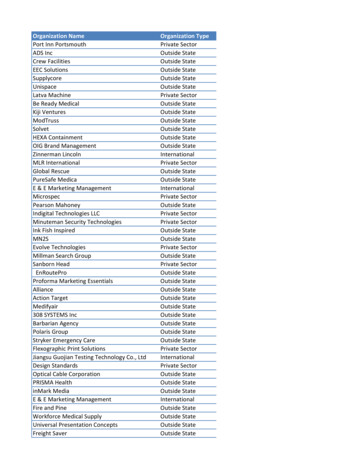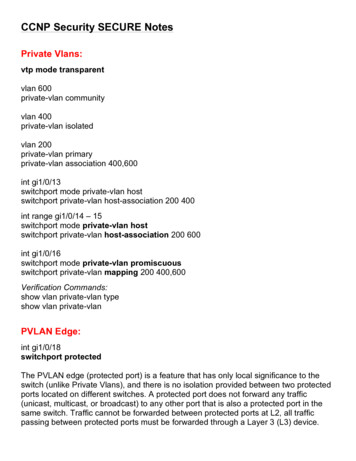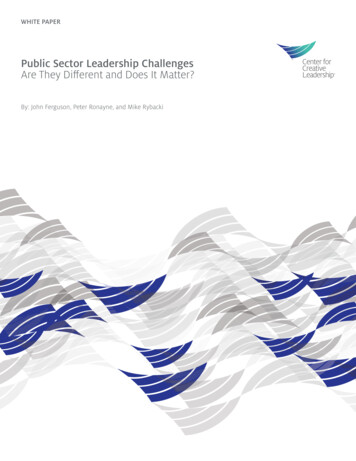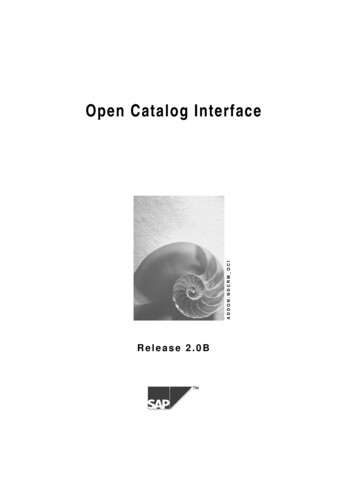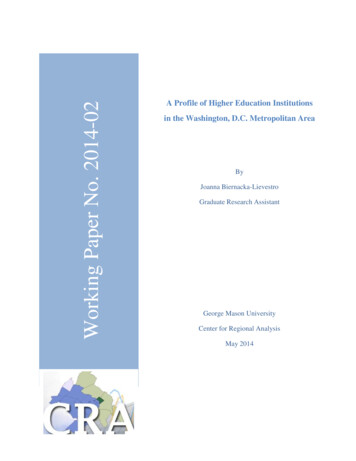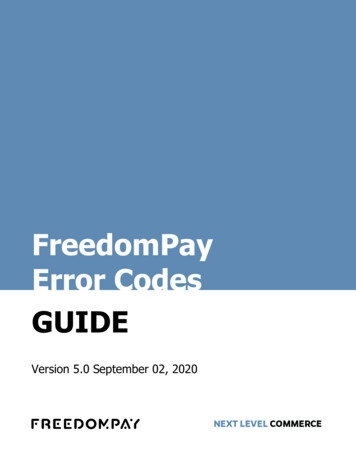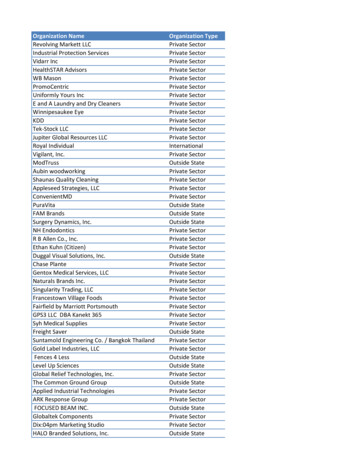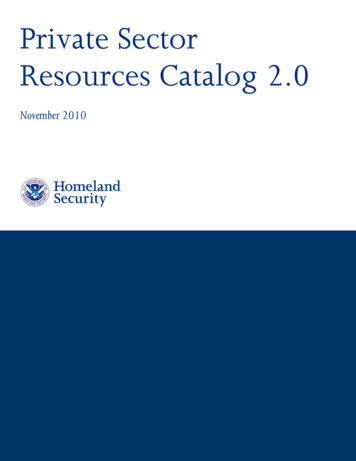
Transcription
Private SectorResources Catalog 2.0November 2010
Intentionally blank page. Please continue to the next page.2
ContentsLetter from Assistant Secretary Douglas A. Smith .4Department-wide Resources .5U.S. Citizenship and Immigration Services (USCIS) .8Citizenship and Immigration Services Ombudsman (CIS Ombudsman). 10U.S. Coast Guard (USCG). 11U.S. Customs and Border Protection (CBP) . 12CBP Publications and Guidance .12CBP Alerts and Newsletters .12CBP Technical Assistance .12CBP Programs and services .13Civil Rights and Civil Liberties (CRCL) . 16CRCL Publications and Guidance .16CRCL Resources .16CRCL Community Engagement .17CRCL Training .17Cybersecurity and Communications (CS&C) . 18CS&C Training and Education .18CS&C Publications and Guidance .18CS&C Alerts and Newsletters.20CS&C Technical Assistance .20CS&C Programs and Services.21Federal Emergency Management Agency (FEMA) . 23FEMA Training and Education .23FEMA Alerts and Newsletters .24FEMA Publications .24FEMA Programs and Services .24U.S. Immigration and Customs Enforcement (ICE) . 27ICE Publications and Resources .27Office of Infrastructure Protection (IP) . 30IP Training and Education .30IP Guidance Documents/Publications .33IP Programs/Services/Events .36IP Web-Based Resources .39Science & Technology Directorate (S&T) . 41S&T Programs .41DHS Centers of Excellence .44Privacy Office . 47Transportation Security Administration (TSA) . 48TSA Training and Education .48TSA Publications and Guidance .50TSA Alerts and newsletters.51TSA Technical assistance and help .51TSA Programs and Services .52Appendix A – Key Contacts . 55Appendix B – Index. 593
Letter from Assistant Secretary Douglas A. SmithNovember 15, 2010Dear Private Sector Partner,DHS developed this catalog to better facilitate your organization’s access to the resources you needto help keep our country secure. Initially released in May 2010, this catalog was the first to betargeted specifically towards private sector partners and to truly encompass all of DHS. Thisdocument collects the training, publications, guidance, alerts, newsletters, programs, and servicesavailable to the private sector from across the department. It is organized by component andresource type and a comprehensive index is available to facilitate locating resources. Additionally,contact information across the department is available in Appendix A. In order to fully capture thebroad array of available resources as well as the continually evolving work of the department, weare now releasing this first update of the catalog.In order to face the new threats and evolving hazards of today’s security environment, we mustdevelop and maintain critical homeland security capabilities at all layers of our society. We allshare the responsibility to build all-hazards preparedness and resiliency into our way of life. Asoutlined in the Quadrennial Homeland Security Review Report, this enterprise approach iscomposed of multiple partners whose roles and responsibilities are distributed and shared amonga broad-based community with a common interest in the public safety and well-being of Americaand American society.The private sector is a critical partner in our homeland security efforts and my office is committedto strengthening the Department’s relationship with organizations such as yours. As primaryadvisor to the Secretary on issues related to the private sector, including academia, non-profits,NGOs, and businesses, the Private Sector Office (PSO) coordinates active engagement betweenDHS and the private sector.Regardless of where your organization fits into the homeland security enterprise, the Private SectorOffice is committed to providing you with the assistance and support you require. You can contactour office at any time with requests, comments, questions, issues or concerns atprivate.sector@dhs.gov, (202) 282-8484.Sincerely,Douglas A. SmithAssistant Secretary for the Private Sector4
Department-wide ResourcesThe Blog @ Homeland Security provides an inside-outview of what we do every day at the U.S. Department ofHomeland Security. The Blog lets us talk about how wesecure our nation, strengthen our programs, and unite theDepartment behind our common mission and principles. Italso lets us hear from you. Visit ion Office is responsible for thedevelopment and implementation of a commercializationprocess and for the execution of two innovative publicprivate partnerships that leverage research anddevelopment efforts in the private sector that are alignedto detailed operational requirements from Departmentstakeholders. The Commercialization Office alsospearheads DHS Science and Technology’s (S&T) outreachefforts that inform the private sector on “How to dobusiness with DHS.” Seehttp://www.dhs.gov/xabout/structure/gc 1234194479267.shtm. Contact: SandT Commercialization@hq.dhs.gov, 1(202) 254-6749.Cooperative Research and Development Agreements(CRADAs) are part of the national Technology TransferProgram, designed to assist Federal laboratories inleveraging taxpayer dollars. As a designated Federallaboratory and a member of the Federal LaboratoryConsortium, the Federal Law Enforcement Training Center(FLETC) can provide personnel services, facilities,equipment and other resources to support research anddevelopment that is beneficial to both FLETC and theCRADA partner. FLETC uses the CRADA program toestablish partnerships for research and development inareas with potential to advance the nation’s ability to trainlaw enforcement personnel. The CRADA program can beused to identify and evaluate emerging technologies andtraining methodologies that can be incorporated into lawenforcement and security training. Seehttp://www.federallabs.org or contact FLETCCRADAProgramOffice@dhs.gov, (912) 267-2591.DHS Center for Faith-based & Neighborhood Partnerships(CFBNP) builds, sustains, and improves effectivepartnerships between government sectors and faith-basedand community organizations. Located within FEMA,CFBNP is a vital communication link and engagementpartner for faith-based and community organizationsacross the entire Department of Homeland Security. Visitwww.dhs.gov/fbci. For more information or to sign up toreceive Information Updates, e-mail Infofbci@dhs.gov.DHS Office of Infrastructure Protection (IP) leads thenational effort to mitigate risk to America's criticalinfrastructure from the full spectrum of 21st Centurythreats and hazards. IP coordinates with government andcritical infrastructure owners and operators across 18diverse sectors to enhance critical infrastructure resilience,strengthen protective programs, and share vitalinformation. For more information on IP programs andresources visit www.dhs.gov/criticalinfrastructure.DHS Private Sector Office As primary advisor to theSecretary on issues related to the private sector, includingacademia, non-profits, NGOs, and businesses, the PrivateSector Office coordinates active engagement between DHSand the private sector to build strong partnerships, shapepolicy, and enhance internal and external dialog. For moreinformation, contact the private sector office atprivate.sector@dhs.gov, (202) 282-8484.DHS Private Sector Updates The DHS Private Sector Officesends a weekly update e-mail collecting homeland securitynews and resources. To subscribe, be.html?code USDHS 99. For more information,contact private.sector@dhs.gov, (202) 282-8484.DisabilityPreparedness.gov is the Disability ResourceCenter of the Interagency Coordinating Council onEmergency Preparedness and Individuals with Disabilities(ICC). Maintained by the DHS Office for Civil Rights andCivil Liberties (CRCL), this site is the main repository forinformation related to the activities of the ICC, includingbimonthly updates regarding federal programs andservices relevant to individuals with disabilities andemergency preparedness. The site also containsinformation to assist individuals with disabilities inpersonal preparedness planning; provides emergencymanagers, first responders, and other disaster serviceproviders with resources relevant to working withindividuals who have disabilities; and offers tips regardinghow individuals with disabilities can get involved inpreparedness activities within their communities. Thisresource can be accessed atwww.disabilitypreparedness.gov. For more information,contact Disability.preparedness@dhs.gov, (202) 357-8483.Electronic Crimes Task Force (ECTF) Program bringstogether not only Federal, State and local lawenforcement, but also prosecutors, private industry andacademia. The common purpose is the prevention,detection, mitigation and aggressive investigation ofattacks on the nation's financial and criticalinfrastructures. The U.S. Secret Service's ECTF andElectronic Crimes Working Group initiatives prioritizeinvestigative cases that involve electronic crimes. Theseinitiatives provide necessary support and resources to fieldinvestigations that meet any one of the following criteria:significant economic or community impact, participationof organized criminal groups involving multiple districts ortransnational organizations, or the use of schemesinvolving new technology. For more information, tion Network The Secret Service eInformationNetwork is available – for free – to authorized lawenforcement officers, financial institution investigators,academic partners, and commercial partners of the SecretService. The site contains three tools: the eLibrary, aunique collection of resource databases which allowsauthorized users from throughout the law enforcementcommunity to obtain information on a range of sensitivetopics including counterfeit corporate checks, credit cardissuing bank information, and recovered skimmingdevices; an Electronic Crimes Task Force component thatserves as an efficient, secure web-based collection of bestpractices, vulnerability guides, National Infrastructure5
Protection Center (NIPC) advisories, and a subject-specificissue library; and the US Dollars Counterfeit Note Search, asite that provides the user with the ability to conduct asearch of the Secret Service counterfeit note database.For more information, see www.einformation.usss.gov.E-Verify and Unfair Labor Practices The DHS Office forCivil Rights and Civil Liberties (CRCL) staff provides trainingon the responsibilities imposed upon the private sectorwhen using E-Verify. Training includes best practices,examples of unlawful practices against workers, andpreparing an HR Department to use E-Verify. The trainingassists employer understanding of how to use E-Verify in aresponsible manner without violating prohibitions againstdiscrimination. In collaboration with U.S. Citizenship andImmigration Services (USCIS), CRCL has created twovideos, Understanding E-Verify: Employer Responsibilitiesand Worker Rights and Know Your Rights: Employee Rightsand Responsibilities, to ensure employers and employeesare knowledgeable about their rights and responsibilities.To view the videos, please visit www.dhs.gov/E-Verify orwww.youtube.com/ushomelandsecurity. For moreinformation, contact CRCL at crcltraining@dhs.gov, (202)357-8258.Homeland Security Information Network (HSIN) is a userdriven, web-based, sensitive but unclassified (SBU)information sharing platform that connects a broad rangeof homeland security mission partners. One portal of theHSIN enterprise is HSIN-CS, managed by the Office ofInfrastructure Protection. DHS has designated HSIN-CS tobe its primary information-sharing platform betweenCritical Infrastructure Key Resource sector stakeholders.HSIN-CS enables DHS and critical infrastructure ownersand operators to communicate, coordinate, and sharesensitive and sector-relevant information to protect theircritical assets, systems, functions and networks, at nocharge to sector stakeholders. Vetted criticalinfrastructure private sector owners and operators areeligible to access HSIN-CS. To request access to HSIN-CS,please e-mail CIKRISEAccess@hq.dhs.gov. Whenrequesting access, please indicate the criticalinfrastructure sector to which your company belongs andinclude your name, company, official e-mail address, andsupervisor’s name and phone number. For moreinformation, see www.dhs.gov/hsin or contacthsin.helpdesk@dhs.gov, (866) 430-0162.Intelligence and Analysis Private Sector PartnershipProgram The Office of Intelligence and Analysis (I&A)strives to synchronize information sharing of timely,accurate, and actionable intelligence information with theprivate sector across the spectrum of business andsecurity operations with respect to protecting privacy andcivil rights and civil liberties. I&A provides private sectorbusinesses, groups, and trade associations with tailoredthreat briefings to meet their security information needs.Additionally, the office creates intelligence products thatare posted on the Homeland Security InformationNetwork-Critical Sectors (HSIN-CS) portal for use by vettedcritical infrastructure owners and operators. For moreinformation, see www.dhs.gov/hsin. To request access toHSIN-CS, e-mail CIKRISEAccess@hq.dhs.gov. Whenrequesting access, please indicate the criticalinfrastructure sector to which your company belongs andinclude your name, company, official e-mail address, andsupervisor’s name and phone number. For moreinformation, contactI&APrivateSectorCoordinator@hq.dhs.gov or call (202)447-3517 or (202) 870-6087.Lessons Learned and Information Sharing (LLIS.gov), a USDepartment of Homeland Security (DHS)/FederalEmergency Management Agency program, is the nationalonline network of lessons learned, best practices, andinnovative ideas for the emergency response andhomeland security communities. This information andcollaboration resource helps emergency responseproviders and homeland security officials prevent, protectagainst, respond to, and recover from terrorist attacks,natural disasters, and other emergencies. To register forLLIS, please visit www.llis.gov, contact the program via email feedback@llis.dhs.gov, or call (866) 276-7001.Office of Small and Disadvantaged Business Utilization(OSDBU) serves as the focal point for small businessacquisition matters and works closely with all DHScomponents to implement the program. OSDBU makesavailable forecasts of contract opportunities, vendoroutreach sessions, a list of component small businessspecialists, DHS prime contractors, and information aboutthe DHS mentor-protégé program. Seehttp://www.dhs.gov/openforbusiness or contact OSDBU,(202) 447-5555.DHS Open Source Enterprise Daily Intelligence Reportsprovide open source information on several topics ofinterest. The following are currently available open sourcereports: The DHS Daily Digest Report, The DHS DailyCyber Report, The DHS Daily Infectious Diseases Report,The DHS Daily Human Trafficking and Smuggling Report,The DHS Daily Drug Trafficking and Smuggling Report,and The Daily Illicit Commercial Trafficking and SmugglingReport. These reports may be accessed on the HomelandSecurity Information Network (HSIN) or private sectorpartners may request that they be added to distribution bye-mailing OSINTBranchMailbox@hq.dhs.gov with subjectline reading “Request DHS Daily *name] Report”.The Voluntary Private Sector Preparedness Accreditationand Certification Program (PS-Prep) The purpose of PSPrep is to enhance nationwide resilience in an all-hazardsenvironment by encouraging private sector preparedness.The program will provide a mechanism by which a privatesector entity-a company, facility, not-for-profitcorporation, hospital, stadium, university, etc.-can certifythat it conforms to one or more preparedness standardsadopted by DHS. Participation in the PS-Prep program iscompletely voluntary. No private sector entity will berequired by DHS to comply with any standard adoptedunder the program. However, DHS encourages all privatesector entities to seriously consider seeking certificationon one or more standards that will be adopted by DHS.For details about PS Prep seewww.fema.gov/privatesector/preparedness.The National Information Exchange Model (NIEM)Program is a Federal, State, local and Tribal interagencyinitiative providing a national approach and commonvocabulary for information exchange. NIEM has a robusttraining curriculum that is accessible both in classroomand on-line. The primary audience for the NIEM TrainingProgram is Executives, Project and Program Managers,Architects and Technical Implementers within Federal,State, local, Tribal and Private Entities. Additionalinformation on the training courses and NIEM can beobtained by visiting www.NIEM.gov or e-mailingNIEMPMO@NIEM.gov.6
Ready Business The U.S. Department of HomelandSecurity and the Advertising Council launched the ReadyBusiness Campaign in September 2004. This extension ofthe successful Ready Campaign, Ready Business helpsowners and managers of small- and medium-sizedbusinesses prepare their employees, operations and assetsin the event of an emergency. For free tools andresources, including how to create a business emergencyplan, please visit www.ready.gov.Traveler Redress Inquiry Program (DHS TRIP) provides asingle point of contact for individuals who have inquiriesor seek resolution regarding difficulties they experiencedduring their travel screening at airports, train stations, orcrossing U.S. borders. To initiate an inquiry, please logonto DHS TRIP’s interactive Web site www.dhs.gov/trip.For more information, contact the TSA Contact Center,(866) 289-9673.7
U.S. Citizenship and Immigration ServicesU.S. Citizenship and Immigration Services (USCIS)U.S. Citizenship and Immigration Services (USCIS) is the government agency that oversees lawful immigration to the United States. USCIS will secure America’s promise as a nation of immigrants byproviding accurate and useful information to our customers, granting immigration and citizenship benefits, promoting an awareness and understanding of citizenship, and ensuring the integrity ofour immigration system. www.uscis.govUSCIS Asylum Program resources include an informationguide for prospective asylum applicants available in anumber of languages, “How Do I” Guides for Refugees andAsylees, and the Asylum Officer Basic Training CourseLesson Plan. For more information, visitwww.uscis.gov/asylum.E-Verify is an Internet-based system that allows anemployer, using information reported on an employee'sForm I-9, to determine the eligibility of an employee towork in the United States. For most employers, the use ofE-Verify is voluntary and limited to determining theemployment eligibility of new hires only. There is nocharge to employers to use E-Verify. Available resourcesinclude searchable web pages, demonstration videos,guides on employee rights and employer responsibilities,fact sheets, weekly webinars, an overview presentation,brochures and posters for employers and employees.USCIS also has speakers and trainers available to give livepresentations at conferences and meetings across thecountry. See http://www.dhs.gov/everify. Contact EVerify@dhs.gov, (888) 464-4218 with any questions orcomments.Civics and Citizenship Toolkit - A Collection of EducationalResources for Immigrants contains a variety ofeducational materials designed to help permanentresidents learn more about the U.S. and prepare for thenaturalization process. For more information, visithttp://www.citizenshiptoolkit.gov.Expanding ESL, Civics, and Citizenship Education in YourCommunity: A Start-Up Guide provides an overview andrecommendations to help organizations design and offerESL and civics/citizenship classes for immigrants. cations/PDFs/M-677.pdf.Form I-9, Employment Eligibility Verification, is a form thatU.S. employers and their new hires have been required tocomplete since November 6, 1986. Completion of the formshows that the employer has examined documentationfrom each newly hired employee to verify his or heridentify and eligibility to work in the U.S. Availableresources include a Form I-9 web page, the M-274,Handbook for Employers, Instructions for Completing FormI-9, and the How Do I Complete Form I-9, EmploymentEligibility Verification? (M-584) brochure. Seehttp://www.uscis.gov. Call (888) 464-4218 with anyquestions or comments.USCIS Genealogy Program is a fee-for-serviceprogram providing family historians and other researcherswith timely access to historical immigration andnaturalization records. The USCIS Genealogy Programoffers two services: Index Search using biographicalinformation provided by the researcher and a Record CopyRequest where researchers with valid record citations(USCIS file numbers), gained through a USCIS GenealogyProgram index search or through independent research,may request copies of historical immigration andnaturalization records. Questions about the USCISGenealogy Program may be sent toGenealogy.USCIS@dhs.gov. For more information, .eb1d4c2a3e5b9ac89243c6a7543f6d1a/?vgnextoid nnel d21f3711ca5ca110VgnVCM1000004718190aRCRD.If You Have the Right to Work, Don’t Let Anyone Take itAway Poster is a poster with Department of Justiceinformation regarding discrimination in the workplace.See yswa-right-to-work.pdf.USCIS Citizenship Resource Center USCIS officiallylaunched the Citizenship Resource Center - a Web-basedportal that centralizes citizenship resources forimmigrants, educators and organizations. This free, easyto-use website will help users understand thenaturalization process and gain the necessary skills to besuccessful during the naturalization interview and test. Tovisit the Citizenship Resource Center, seehttp://www.uscis.gov/citizenship.USCIS Information for Employers and Employees on theemployment authorization verification process and theimmigration petition process. .eb1d4c2a3e5b9ac89243c6a7543f6d1a/?vgnextoid nnel ff1d83453d4a3210VgnVCM100000b92ca60aRCRD. For moreinformation contact Public.Engagement@dhs.gov.USCIS Information for Prospective Adoptive Parentsprovides information about adopting a child from overseasand the process by which to do so, dependent on thecountry chosen to adopt from. .eb1d4c2a3e5b9ac89243c6a7543f6d1a/?vgnextoid nnel 8d5e901bf9873210VgnVCM100000082ca60aRCRDGuide to Naturalization contains information about thenaturalization process, laws and regulations. Seehttp://www.uscis.gov/files/article/M-476.pdf.8
U.S. Citizenship and Immigration ServicesUSCIS Office of Public Engagement (OPE) seeks to focuson open, candid, and constructive collaboration withcommunity stakeholders at all levels. OPE coordinates anddirects USCIS-wide dialogue with external stakeholders toadvance the Agency’s vision of customer inclusiveness byactively engaging stakeholders to ensure information flowand to institutionalize a mechanism whereby their inputwill be considered in the process of policy formulation,priority calibration, and assessment of organizationalperformance. The goal of the office is to provideinformation and invite feedback to inform our work. Seethe Outreach tab at http://www.uscis.gov. For moreinformation contact Public.Engagement@dhs.gov.USCIS Resources USCIS offers a variety of resources forour customers, the organizations that serve them and thepublic. USCIS is committed to supporting the resourceneeds of stakeholders, including Congress, communitybased organizations and legal practitioners, and educatorsand researchers. Resources include customer guides,videos, citizenship toolkits, an immigration law glossary,reports and studies, civics and citizenship educationresources, and a historical library. See the “Resources”section at http://www.uscis.gov. For more informationcontact Public.Engagement@dhs.gov.Welcome to the United States: A Guide for NewImmigrants With this landmark publication, the federalgovernment reaches out to new immigrants with essentialorientation materials n
The site contains three tools: the eLibrary, a unique collection of resource databases which allows authorized users from throughout the law enforcement community to obtain information on a range of sensitive . see www.einformation.usss.gov. E-Verify and Unfair Labor Practices The DHS Off
